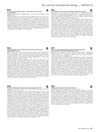 55 citations,
February 1985 in “Archives of Dermatology”
55 citations,
February 1985 in “Archives of Dermatology” Using minoxidil on the scalp can help grow hair for people with hereditary baldness.
 37 citations,
February 2007 in “Clinical Obstetrics and Gynecology”
37 citations,
February 2007 in “Clinical Obstetrics and Gynecology” The document concludes that treating PCOS requires a combination of drugs to manage reproductive and metabolic symptoms, with more research needed on combination therapies.
 24 citations,
February 1987 in “Drugs”
24 citations,
February 1987 in “Drugs” Minoxidil promotes hair regrowth, but more research needed for effectiveness and response factors.
 October 2024 in “Journal of Advanced Pharmaceutical Technology amp Research”
October 2024 in “Journal of Advanced Pharmaceutical Technology amp Research” Trigonelline nanocrystal cream effectively promotes hair growth and may reduce side effects.
September 2024 in “Colloids and Surfaces B Biointerfaces” Cedrol nanoemulsions effectively treat hair loss by promoting hair growth and reducing DHT levels safely.
 April 2017 in “Journal of Investigative Dermatology”
April 2017 in “Journal of Investigative Dermatology” Applying pseudoceramide improved skin and hair health.
 58 citations,
October 1993 in “International Journal of Dermatology”
58 citations,
October 1993 in “International Journal of Dermatology” Minoxidil helps hair growth and reduces shedding in women.
 23 citations,
June 2014 in “Journal of Pharmaceutical Sciences”
23 citations,
June 2014 in “Journal of Pharmaceutical Sciences” Finasteride cream helps hair growth with less side effects.
2 citations,
February 2024 in “Pharmaceutics” Chitosan scaffolds with silver nanoparticles effectively treat infected wounds and promote faster healing.
 1 citations,
February 2017 in “MOJ bioequivalence & bioavailability”
1 citations,
February 2017 in “MOJ bioequivalence & bioavailability” Treating hair loss effectively may require a multi-sided approach, using different treatments together, and topical treatments could be more effective and safer than oral ones.
 May 2023 in “Journal of Ethnopharmacology”
May 2023 in “Journal of Ethnopharmacology” The wild garlic plant, Allium macrostemon Bunge, can promote hair growth and could potentially be used to treat hair loss.
14 citations,
May 2016 in “Therapeutic advances in urology” Taking tadalafil and finasteride together is safe and effective for treating urinary symptoms and erectile dysfunction in men with enlarged prostates.
 10 citations,
December 2020 in “Dermatologic Therapy”
10 citations,
December 2020 in “Dermatologic Therapy” Minoxidil and spironolactone combo effectively treats androgenetic alopecia, improving hair density and diameter.
 10 citations,
January 2016 in “Dermatologic Clinics”
10 citations,
January 2016 in “Dermatologic Clinics” Some acne medications have side effects; doctors should educate patients and may not need to do frequent lab tests for all.
 October 2024 in “Frontiers in Neurology”
October 2024 in “Frontiers in Neurology” Interventional embolization is effective for treating scalp arteriovenous fistula but can cause complications like swelling and hair loss.
 August 2023 in “Journal of Cosmetic Dermatology”
August 2023 in “Journal of Cosmetic Dermatology” Higher concentration of botulinum toxin A is safe and effective for treating hair loss in men and women.
 October 2000 in “Annals of Dermatology”
October 2000 in “Annals of Dermatology” Finasteride effectively treats hair loss in men with minimal side effects.
 8 citations,
October 2020 in “Pharmaceutics”
8 citations,
October 2020 in “Pharmaceutics” Dutasteride-loaded nanoparticles coated with Lauric Acid-Chitosan show promise for treating hair loss due to their controlled release, low toxicity, and potential to stimulate hair growth.
 2 citations,
July 2020 in “Giornale italiano di dermatologia e venereologia”
2 citations,
July 2020 in “Giornale italiano di dermatologia e venereologia” A woman with frontal fibrosing alopecia experienced unusual hair growth after using a specific topical lotion.
 45 citations,
May 2018 in “Stem Cell Research & Therapy”
45 citations,
May 2018 in “Stem Cell Research & Therapy” Using patients' own fat-derived cells to treat alopecia areata significantly improved hair growth and was safe.
 37 citations,
January 2013 in “Postepy Dermatologii I Alergologii”
37 citations,
January 2013 in “Postepy Dermatologii I Alergologii” Isotretinoin effectively reduces acne but causes dry skin, higher skin pH, more redness, and hair loss.
 26 citations,
December 2006 in “Endocrinology”
26 citations,
December 2006 in “Endocrinology” A cream with a specific hormone blocker increases hair growth in mice.
 25 citations,
November 2001 in “Kidney International”
25 citations,
November 2001 in “Kidney International” Male hormones worsen kidney transplant damage, but blocking them helps.
 24 citations,
September 2005 in “Journal of Cellular Biochemistry”
24 citations,
September 2005 in “Journal of Cellular Biochemistry” Retinoids increase steroid sulfatase activity in leukemia cells through RARα/RXR and involves certain pathways like phosphoinositide 3-kinase and ERK-MAP kinase.
 23 citations,
March 1988 in “Biochemical Pharmacology”
23 citations,
March 1988 in “Biochemical Pharmacology” Minoxidil stops cells from making prostacyclin, which may help with hair growth. More research is needed.
 22 citations,
January 2001 in “Chemical & Pharmaceutical Bulletin”
22 citations,
January 2001 in “Chemical & Pharmaceutical Bulletin” Some new progesterone derivatives are better at blocking testosterone conversion than a common drug.
 20 citations,
April 2016 in “Journal of Cosmetic Dermatology”
20 citations,
April 2016 in “Journal of Cosmetic Dermatology” Methyl vanillate spray increases hair count and hair mass in women with hair loss.
 11 citations,
October 1994 in “The Journal of Clinical Endocrinology and Metabolism”
11 citations,
October 1994 in “The Journal of Clinical Endocrinology and Metabolism” Finasteride increases hair growth, prolongs hair cycle, and lowers dihydrotestosterone levels.
 9 citations,
March 2021 in “Hormones”
9 citations,
March 2021 in “Hormones” COVID-19 may affect male fertility and women might have better outcomes due to hormonal and immune differences.
![Synthesis and Activity of 8-Substituted Benzo[c]quinolizin-3-ones as Dual Inhibitors of Human 5α-Reductases 1 and 2](/images/research/efc54340-66d6-4f27-9930-045ac023f903/small/15248.jpg) 9 citations,
November 2004 in “Bioorganic & Medicinal Chemistry Letters”
9 citations,
November 2004 in “Bioorganic & Medicinal Chemistry Letters” New compounds were made that effectively block enzymes related to prostate issues and hair loss.



























![Synthesis and Activity of 8-Substituted Benzo[c]quinolizin-3-ones as Dual Inhibitors of Human 5α-Reductases 1 and 2](/images/research/efc54340-66d6-4f27-9930-045ac023f903/small/15248.jpg)